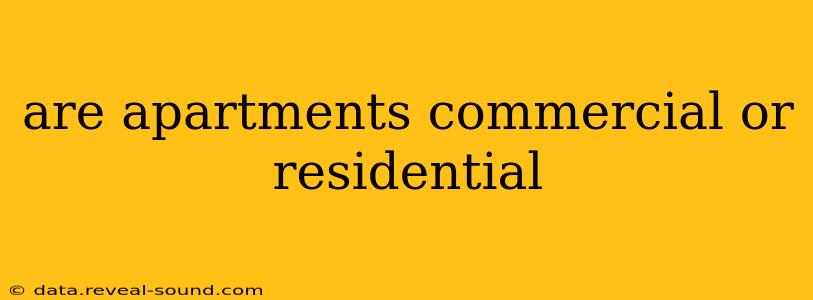The simple answer is: apartments are residential properties. However, the classification isn't always so straightforward, as the line can blur depending on several factors. This article will delve into the nuances of apartment classification, clarifying the differences and exploring situations where the lines become less distinct.
What Defines Residential Property?
Residential properties are primarily designed for dwelling—meaning they provide living spaces for individuals or families. Key characteristics include features that support daily living, such as bedrooms, kitchens, bathrooms, and living areas. The primary purpose is habitation, not business operations. Examples include single-family homes, townhouses, condos, and, yes, apartments.
What Defines Commercial Property?
Commercial properties, on the other hand, are used for business activities. These properties are geared towards generating revenue through commercial ventures. Offices, retail spaces, shopping malls, and industrial buildings are typical examples. The primary purpose is profit generation, not solely for residential occupancy.
Why the Confusion?
The confusion sometimes arises because some apartment buildings might contain commercial spaces within the complex. A building might house residential units on multiple floors, but the ground floor could include retail shops or commercial offices. This doesn't change the classification of the apartments themselves; they remain residential. The entire building might be considered a mixed-use property, but the residential and commercial components are distinct.
What About Apartment Buildings with Amenities?
Many apartment complexes offer amenities like gyms, swimming pools, and business centers. These additions are considered part of the residential offering, enhancing the living experience for tenants. They don't change the fundamental residential nature of the property.
How is this Classification Important?
Understanding the residential classification of apartments is crucial for several reasons:
- Zoning regulations: Local governments use zoning laws to regulate the types of buildings allowed in specific areas. These regulations often differentiate between residential and commercial zones.
- Taxes: Property taxes differ between residential and commercial properties. Residential properties typically have lower tax rates.
- Insurance: Insurance policies for residential and commercial properties vary significantly in coverage and premiums.
- Leasing and regulations: Residential leases and regulations differ from commercial leases. Tenant rights and landlord responsibilities vary considerably.
Are there exceptions?
While rare, there might be instances where an apartment is technically used for a commercial purpose, such as an Airbnb rented out frequently for short-term stays. However, even in these situations, the underlying property remains a residential unit; it's the use that is commercial, not the property's inherent classification. Legalities surrounding such uses are often determined by local ordinances and could lead to zoning or licensing issues.
So, the final answer?
Apartments are fundamentally residential properties. The presence of commercial spaces within a larger building complex or the inclusion of amenities doesn't alter this core classification. Understanding this distinction is vital for tenants, landlords, investors, and local authorities alike.
